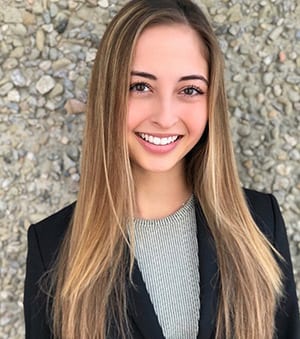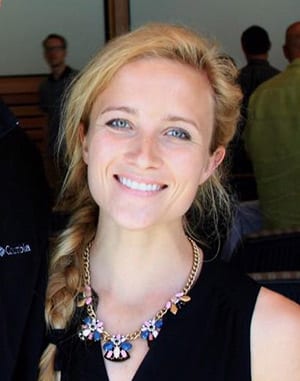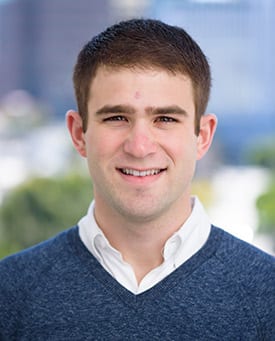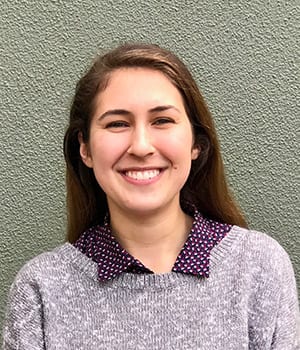By Andrew Cohen

Gaining valued work experience during law school. Making connections with high-level attorneys. Living in a new state or country. For students in Berkeley Law’s Away Field Placement Program, the benefits are many and meaningful.
At a recent panel event, four students who held such placements last fall discussed the details and rewards of their semester outside the law school bubble.
“You really gain so much through hands-on learning,” said Regina Molina Ochoa ’19, who worked at the Security and Exchange Commission in New York City. “The program exposes you to things you just can’t get in a class. It’s a unique experience to get to live where you want in the world, meet other law students, and do something you enjoy. It also looks good on your resume.”
Molina Ochoa shared her insights with fellow 3Ls Nir Maoz (UCLA Technology Development Group in Los Angeles), Andi Maddox (UN International Residual Mechanism for Criminal Tribunals in The Hague), and Luisa Lizoain (Toronto International Film Festival).
Away field placement students receive 10 to 12 academic credits for legal work at approved nonprofits or government agencies outside the Bay Area. Berkeley Law had 75 overall Field Placement Program students last semester, including 19 in the away program—seven of whom worked in different countries.

“I learn best by doing, and the kind of work I did in The Hague was unlike anything I’d done,” Maddox said. “At the tribunal, I worked a lot with evidence and witnesses and developed practical skills. It was an honor to help prosecute war criminals. Going to a big firm, I think having worked on a criminal trial will be a useful experience.”
Different draws
Students’ reasons for pursuing away field placements are as varied as their career interests. For Lizoain, the semester offered a chance to live at home and an intimate working dynamic as the office’s only intern assisting its only attorney.
“I’m really glad I did it,” she said. “It gave me great insight into how in-house legal counsel works, which is very different from being in a firm.”
By contrast, Molina Ochoa worked with about 30 interns in her SEC office, received formal mentoring, and relished the chance to live in a new city.
The students described the freedom that a 9 to 5 work schedule with no schoolwork offers, and how to navigate logistics involving housing, health insurance, and visas. Maddox urged students considering the program, to “learn as much as you can about the actual work you’ll actually be doing so you won’t be surprised.”

Maoz wanted to get more corporate transactional experience, “which you often don’t get in law school,” he said. “To me, it was worth giving up a full semester of school. The amount of drafting and negotiation work I did, I don’t think I would get that even in the first few years at a law firm, so for me it was priceless.”
All four students will work at law firms after taking the bar this summer: Molina Ochoa at Morrison & Foerster in San Francisco; Maddox at Kramer Levin in New York City; Maoz at Klee, Tuchin, Bogdanoff & Stern in Los Angeles; and Lizoain at O’Melveny & Myers in Century City.
Increasingly popular
The number of away field placement students has more than tripled since 2006. They attend an orientation before departing, maintain contact with school liaisons, and write reflective memos about their work every other week.
Last semester, in addition to Maddox and Lizoain, students worked in other countries at Amnesty International in Prague, a nonprofit in Mexico that provides legal services to migrants, the U.S. Department of Justice’s Office of Foreign Litigation in London, the European Commission’s International Data Flows and Protection Unit in Brussels, and the International Trade Centre in Geneva.

In the U.S., in addition to Maoz and Molina Ochoa, students worked outside the Bay Area in placements at federal courts and the ACLU, U.S. Attorney’s Office, SEC, and Rocky Mountain Children’s Center.
“We see people come back refreshed after changing things up and taking on a new experience,” Field Placement Director Susan Schechter said. “Being in the workplace and getting that experience also helps you get hired. We want our students to see how lawyers practice and learn what type of lawyer they want to be. Again and again, students tell us it’s one of their favorite experiences in law school.”
Molina Ochoa, who worked in the SEC’s new cyber unit and focused on emerging cryptocurrency issues, agreed.
“It’s one of the best things Berkeley Law offers,” she said of the Field Placement Program. “I’d definitely recommend taking advantage of it.”